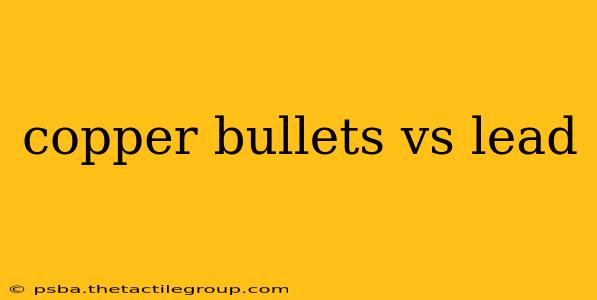Choosing the right ammunition is crucial for any shooter, whether you're a hunter, a competitive shooter, or a self-defense enthusiast. Two prominent projectile materials dominate the market: lead and copper. This detailed comparison explores the advantages and disadvantages of each, helping you make an informed decision based on your specific needs and priorities.
Lead Bullets: The Traditional Choice
Lead bullets have long been the industry standard due to their affordability and ease of manufacture. Their relatively soft nature allows for easy expansion upon impact, leading to effective energy transfer and increased stopping power, particularly in hunting applications.
Advantages of Lead Bullets:
- Cost-Effective: Lead is significantly cheaper than copper, making lead bullets a budget-friendly option for high-volume shooting.
- Easy to Cast: Reloading with lead bullets is relatively simple and inexpensive, appealing to budget-conscious reloaders.
- Excellent Expansion: The softness of lead contributes to reliable expansion and effective wound channels, ideal for hunting.
Disadvantages of Lead Bullets:
- Environmental Concerns: Lead is a toxic heavy metal, posing environmental risks, especially in areas where lead ammunition is used frequently (e.g., hunting ranges). Many jurisdictions have restricted or banned lead ammunition for this reason.
- Fouling: Lead bullets leave significant residue in the firearm's barrel, requiring more frequent cleaning to maintain accuracy and prevent damage.
- Toxicity Risk: Handling lead bullets requires caution, as lead exposure can be harmful to human health.
Copper Bullets: The Modern Alternative
Copper bullets are gaining popularity due to their performance advantages and environmentally friendly nature. While more expensive than lead, their superior ballistic characteristics appeal to many shooters.
Advantages of Copper Bullets:
- Environmentally Friendly: Copper is non-toxic and recyclable, making it a more sustainable option compared to lead.
- Less Fouling: Copper bullets produce significantly less barrel fouling than lead, resulting in less cleaning and potentially longer barrel life.
- Superior Ballistic Coefficients: Copper bullets often exhibit higher ballistic coefficients, meaning they retain velocity and energy over longer ranges, offering improved accuracy and performance.
- Consistent Expansion: Many copper bullets are designed for consistent expansion at various velocities, offering reliable performance across a wider range of shooting scenarios.
Disadvantages of Copper Bullets:
- Higher Cost: Copper is considerably more expensive than lead, making copper bullets a more costly option, especially for high-volume shooters.
- Potential for Overpenetration: The hardness of copper can sometimes lead to overpenetration, especially in less-dense targets. However, this depends heavily on bullet design and velocity.
Choosing Between Lead and Copper: Key Considerations
The best choice between lead and copper bullets depends heavily on individual needs and priorities. Consider these factors:
- Budget: Lead bullets are significantly cheaper, while copper bullets represent a premium option.
- Environmental Concerns: If environmental responsibility is a priority, copper bullets are the clearer choice.
- Shooting Discipline: Hunters often prioritize expansion and stopping power, while target shooters prioritize accuracy and consistent performance.
- Legal Restrictions: Check local and state regulations regarding lead ammunition usage before purchasing.
Conclusion: A Balanced Approach
Both lead and copper bullets offer distinct advantages and disadvantages. The "best" choice is highly contextual and depends on the individual shooter's requirements. Careful consideration of the factors discussed above will allow you to select the ammunition that best suits your needs and maximizes shooting performance while adhering to ethical and legal considerations. Responsible ammunition selection contributes to both successful shooting and environmental stewardship.

